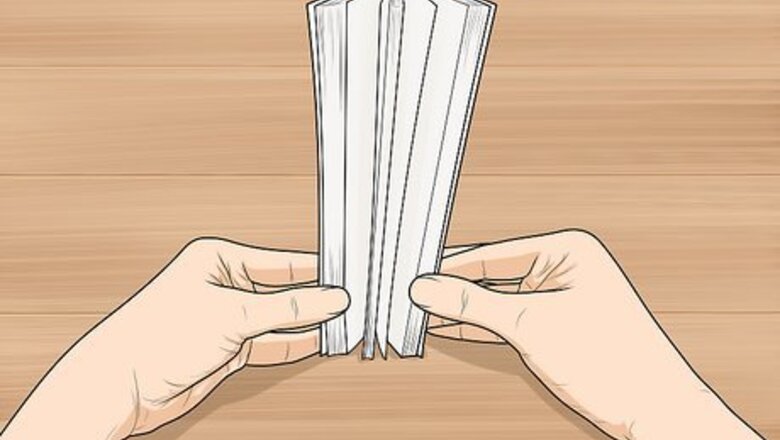
views
- Place your books upright in front of a fan or hairdryer to dry damp pages that are creating musty smells.
- To absorb mildew odors, set your books in a sealed box with baking soda, cat litter, or charcoal for 2-3 days. Repeat with fresh material if necessary.
- Or, place sheets of MicroChamber paper between every 5-10 pages. Check on the odor every few days and remove the paper when the odor is gone.
Airing Out Damp Books to Remove Mold, Mildew, and Odors
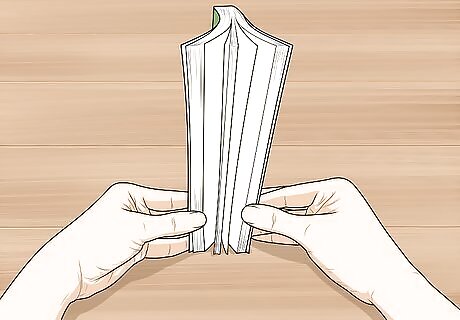
Fan out the pages of your book in a well-ventilated area. If your books smell old and musty, they might be damp. This creates the perfect breeding ground for mold and mildew, which can amplify the unpleasant odors. Just take your smelly or damp books to a room that gets good air circulation. Then, stand them upright on a table and fan out the pages gently with your fingers. If your books have active mold or mildew growth, which looks like fuzzy black or pink spots, put on a pair of gloves and a respirator before handling them. If the mold growth is moderate or severe, throw the book away and replace it. Use a letter opener or tweezers to fan out the pages if you can’t easily separate them with your fingers. Or, blow toward the top of your book. Books also develop an old, musty smell due to natural degradation or if they were previously contaminated with mold and mildew. Even if they’re not wet, airing them out is an effective way to remove the smell. Books are a common food source for mold and mildew. They become more attractive to these fungi when they’re wet or exposed to moisture.
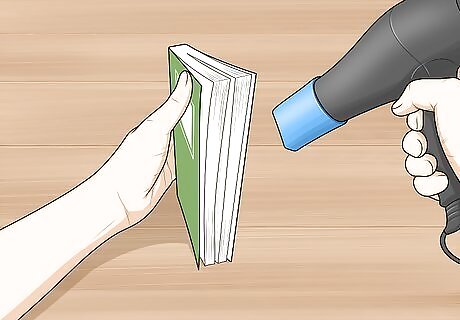
Blow the pages dry with a fan or a hairdryer. To speed up the drying process, set an oscillating fan in front of the books. Or, turn a hairdryer on low heat and aim it at the pages of your book from 8 to 12 inches (20-30 cm) away. Just keep the fan or hairdryer on until the pages are dry. Depending on how damp or smelly your book is, it can take anywhere from a few hours to 1 day for the odors to dissipate.

Expose the books to sunlight for 30 minutes if they’re not antique. Sunlight helps to dry out your books further and can treat smaller cases of mold and mildew. Just wait for a day that is breezy and dry. Then, fan out the pages of your books and set them upright in a spot that receives direct sun. Only leave them in the sun for 30 minutes, as the light can fade and degrade the books. If the relative humidity is over 65%, do not place your books outside. Do not expose old, antique books to direct sun. This can lead to permanent disintegration, discoloration, and the curling up of the pages.
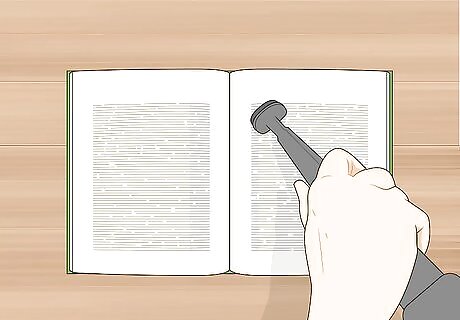
Vacuum or brush off the book if it contained mold or mildew. If your damp books were growing mold and mildew, drying them out deactivates the fungi and turns them into powder. To clean off the mold or mildew, take the books outside. Then, put on a respirator and vacuum the pages using a brush attachment that’s covered with a cheesecloth. Or, wipe the powder away with a soft-bristled brush or dry rag. Vacuuming or brushing off the mold and mildew releases them into the air, which is why it’s best to clean off your books outside. If you have a wet-dry or high-efficiency particulate arrestant (HEPA) vacuum, use that instead. These vacuums can be used inside.
Absorbing and Neutralizing the Musty Odors
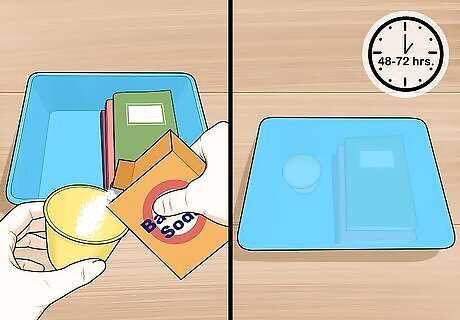
Set the books in a closed container with baking soda for 2-3 days. Fan out your books and stand them up in a small, open cardboard box, crate, or plastic bin. Then, get out a larger container with a lid that the small box fits inside, like a trash can or plastic bin. Set 1 cup (272 g) of baking soda into the bottom of the larger container. Just place the container with the book inside, close the lid, and let them sit for 48-72 hours. Check on the books’ smell after 2 to 3 days. If they still have a mildew odor, replace the baking soda and repeat until they smell fresh. Baking soda is a powerful, natural deodorizer. It doesn’t just mask odors and instead absorbs and neutralizes them. Do not sprinkle baking soda directly on your books or let them touch it as baking soda can damage the pages.
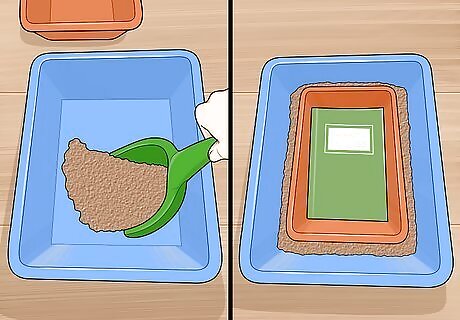
Or, pour kitty litter into the closed container as an alternative. Cat litter also contains minerals that trap and neutralize the musty, mildew odors emanating from your books. Just fill a large container with a lid about halfway with kitty litter. Then, spread out the pages of your books and stand them upright in a smaller container. Place the small container inside the large one, close the lid, and leave the books for 2 to 3 days. Open the container after a few days to check on the smell. If the odor isn’t gone, replace the kitty litter and repeat until the books smell better.
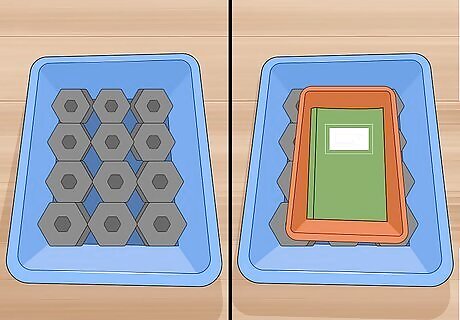
Or, add charcoal to the bottom of the container as another option. Activated charcoal is another great deodorizer that lifts and removes smelly mildew. Simply place a handful of charcoal briquettes in the bottom of a large plastic bin with a lid. Then, fan out your books and set them inside a smaller, open container that fits inside the bin. Insert the small container in the big one, close the container, and leave the books to sit for 2 to 3 days. If your books still smell musty after several days, replace the charcoal and repeat.
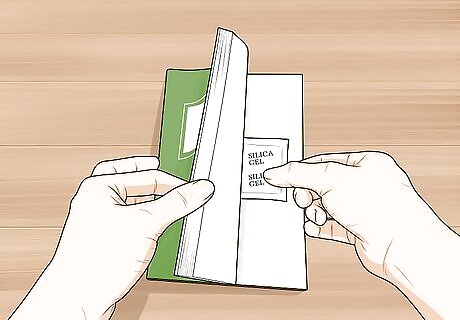
Place silica packets in a plastic bag with the books. Silica gel packets are great for removing odors and moisture from the air; you can typically find them at arts and crafts stores. Just place a handful of the packets in a large plastic bag or container and add in your books. Then, seal up the container and leave the books for 2 to 3 days. If the smell isn’t gone after a few days, replace the silica packets and leave the books in the bag for an additional 2 to 3 days. Or, set the silica packs between the pages of your book and leave them in a bag for 2 to 3 days. If you don’t want to create indents on the pages, leave the silica in the book for 1 day.
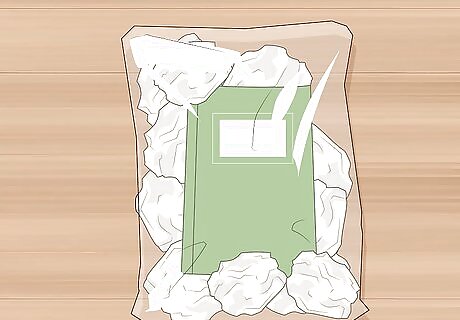
Crumple newspaper and set it in a plastic bag as an alternative. Newspaper is a great, natural odor absorber. Lightly ball up several sheets of newspaper and place them inside a plastic bag or bin. Then, insert your books and seal up the container. Just leave the books in the bag or bin for 2 to 3 days.
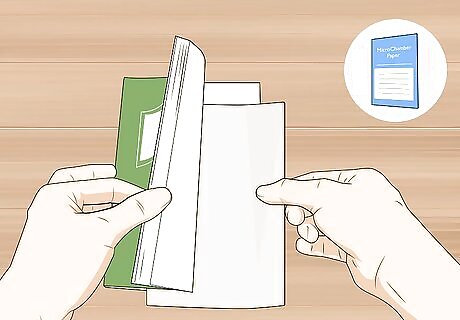
Place sheets of MicroChamber paper between the pages of your books. Library conservationists typically use special paper, called MicroChamber paper, to absorb and remove smells from books. Simply place a sheet of this paper between the covers and after every 5 to 10 pages. Check on the smell every few days and remove the sheets once your book smells fresh again. If your books are very old and musty, leave the paper in for 1 month. If the books still smell like mildew, replace the paper and repeat. Alternatively, set sheets of newspaper between the pages of books that aren’t old or antiques. Only leave the newspaper in your books for 3 to 5 days, as the acids can degrade the pages.
Hiding Odors
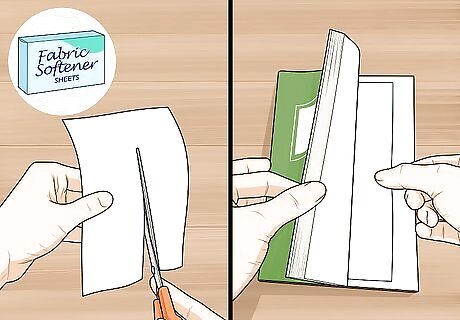
Insert dryer sheets between the pages of your books. Dryer sheets infuse clothes with a clean, pleasant scent and can leave your books smelling fresh, too. Simply cut several sheets into thirds and put them between every 20 pages or so in the smelly book. Place the books in a sealed, plastic bag and leave them in there for several days. The oils in dryer sheets can damage books, so do not use them on old, antique books. This method is great for preventing books from smelling musty as well. Just put a piece of the dryer sheet in every fifth book on your bookshelf.
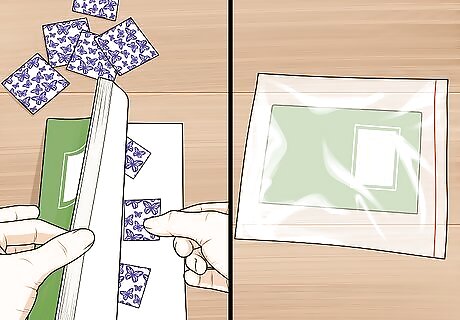
Cut pieces of a fragrant drawer liner and place them inside the book. Some drawer liners are scented, which makes them great for masking the odors coming from your book. Take 2 to 3 pieces of the liner, depending on the size of the book, and place them between the covers and pages. Then, set the book inside a resealable plastic bag for 1 to 2 weeks. After 1 week, check to see if the drawer liner’s fresh scent transferred to the book. If it didn’t, leave the books in the bag until they smell better.
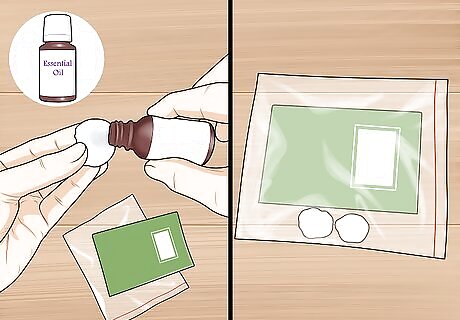
Pour essential oils on cotton balls and set them in a bag with the books. Simply add a few drops of essential oil like lavender, eucalyptus, or tea-tree oil onto some cotton balls. Then, place them in a sealable plastic bag and add your books. Leave the books in the bag for a few days, then check on their smell. The essential oils can stain your books, so only use this method on less valuable books that you want to read.
Storing Books to Prevent Mildew Smells
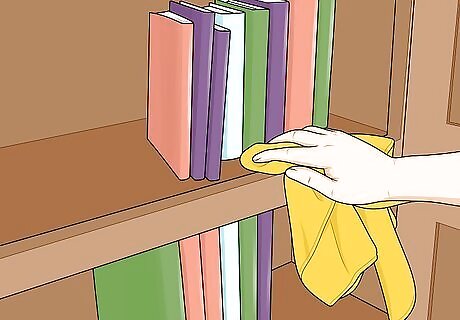
Keep books at room temperature in light, dry areas that get good airflow. Dark areas with stale, humid air that fluctuates in temperature can encourage mold and mildew to grow. So, store your books somewhere in your home that is well-ventilated and gets some indirect light. Then, make sure that it stays around 70° F (21° C) and between 45–65% relative humidity. If you don’t have a place that is well-ventilated or stays dry, add a fan to improve air circulation and a dehumidifier to lower the humidity. Do not store books in bright, direct light as it can fade and damage them. Attics and basements are generally bad areas to store books long-term, as they are dark, damp, and prone to temperature fluctuations. If you’re storing your books in a storage facility, make sure it’s temperature regulated.
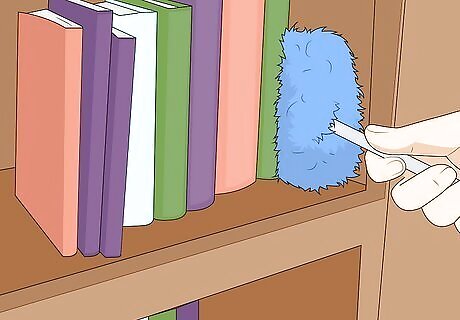
Dust your books regularly. Mold and mildew spores often grow on tiny specks of dust that accumulate on your books and bookshelves. So, make it a weekly habit to wipe down your shelves with a damp cloth and go over your books with a feather duster.
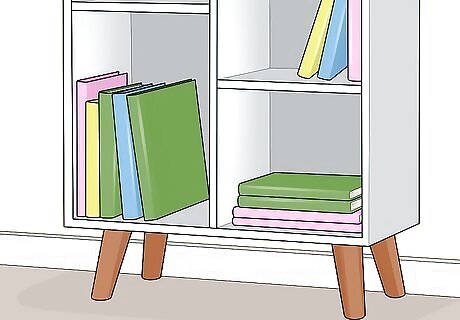
Add space between your books and shelve them on interior walls. Instead of cramming your books onto your bookshelf, leave a bit of space in between each one. This ensures that there is adequate airflow between the books, which prevents mold and mildew. Then, place your books against interior walls instead of walls that face outside. Outside walls feel the effects of temperature and humidity changes more than interior walls, which can make your books more prone to mold or mildew.
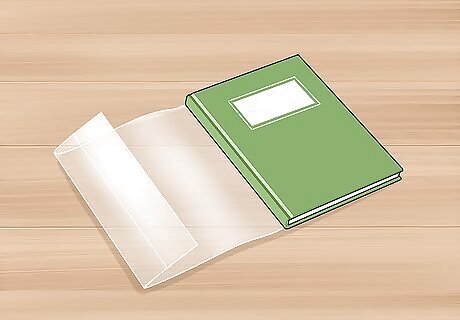
Add dust jackets to your books. Dust jackets are clear, protective sheets of plastic that go on the outside of your books; they keep moisture and dust away which helps prevent mold and mildew from growing. It's easier and cheaper to replace dust jackets if they get wet or damaged than it is to replace your books’ covers or bindings.
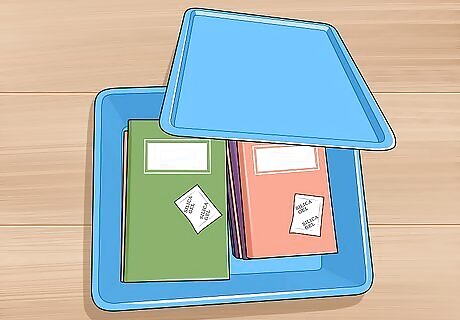
Place books in plastic storage containers if you’re storing them away. To prevent moisture from ruining your books, set them down flat in plastic bins with air-tight lids. As an extra precaution, add several silica gel packets to absorb any smells and moisture.



















Comments
0 comment